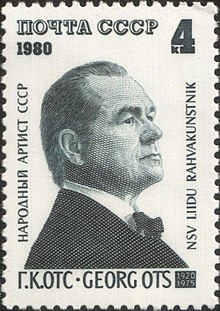Georg Ots
Georg Ots ( Russian Георг Карлович Отс ; March 21, 1920 in Petrograd , Soviet Russia - September 5, 1975 in Tallinn , Estonian SSR ) was a Soviet - Estonian opera singer (baritone).
Life
education
Georg Ots was the son of the famous Estonian tenor Karl Ots . He first studied singing with the tenor Aleksander Arder in Yaroslavl , where an Estonian cultural brigade had formed during the time of the Soviet Union . In addition, he received training as an engineer , which he completed in 1941.
opera singer
With the occupation of Estonia by the Soviet Union, Ots moved to Tallinn . His career as an opera singer in the Estonia Opera began in 1944 with a role in Eugene Onegin . From 1951 he was entrusted with larger roles. Ots quickly became widely known and became one of the most popular singers in the Soviet Union. He was particularly successful at the Bolshoi Theater in Moscow and Leningrad , where he appeared regularly. His repertoire included above all Eugene Onegin, Prince Jeletzkij , Escamillo , Don Giovanni , Papageno , Rigoletto , Iago , Porgy , Figaro and the title role in Kabalewski's Colas Breugnon .
He was most successful in the leading role in Anton Rubinstein's opera The Demon . Ots appearances brought Lermontov's 1841 poem , which is actually frowned upon in the Soviet Union , to new popularity: it depicts the mesalliance between a fallen angel and a Georgian princess.
Musical star
Ots achieved his popular breakthrough with his appearances in the most popular film musicals in the Soviet Union. In 1958 he played the leading role in Mr X , produced by Lenfilm , based on Emmerich Kálmán's operetta Die Zirkusprinzessin . Ots also played the title role in the film adaptation of the novel The Life of Balthasar Rüssow by Jaan Kross .
song
Georg Ots also sang songs, especially by Schubert , Mussorgsky , Tchaikovsky and other Russian composers. His enormous talent for foreign languages helped him. He became famous in his native Estonia and Finland for his modern interpretations of Estonian folk songs . As one of the few Soviet singers, Ots also gained notoriety in America and Western Europe, where he went on concert tours with the support of authorities interested in foreign currency . His records were in great demand all over the Soviet Union.
He also sang in German, including the song Do you think the Russians want war? , in which the hope is expressed that every man "can sleep in peace".
Georg Ots died of cancer in Tallinn at the age of 55 .
Private life
Georg Ots was married three times. His wives Margot, Asta and Ilona gave him two daughters and a son. He also had two adopted sons.
Awards
In 1956 he became a national artist of the Estonian Soviet Socialist Republic, in 1960 a national artist of the Soviet Union. Ots was an active member of the CPSU .
Aftermath
The Estonian Music Academy in Tallinn was named after Georg Ots in 1975. The ferry that ran between Tallinn and Helsinki from 1980 to 2000 was named M / S Georg Ots . In 1977, Russian astronomers named an asteroid after him ( asteroid 3738 Ots ). A luxury hotel in Kuressaare is called Georg Ots Spa Hotell .
literature
- Helga Tõnson: Georg Ots. Tallinn 1975
- Kulle Raig: Saaremaa valss: Georg Otsa elu. Tallinn 2003
Web links
- Georg Ots at Operissimo on the basis of the Great Singer Lexicon
- Music site with numerous audio samples
- Life and Work (English)
- About Georg Ots (Estonian Institute, English)
- Georg Ots in theInternet Movie Database(English)
| personal data | |
|---|---|
| SURNAME | Ots, Georg |
| ALTERNATIVE NAMES | Ots, Georg Karlowitsch (full name); Отс, Георг Карлович (Russian) |
| BRIEF DESCRIPTION | Soviet-Estonian opera singer (baritone) |
| DATE OF BIRTH | March 21, 1920 |
| PLACE OF BIRTH | Petrograd , Soviet Russia |
| DATE OF DEATH | 5th September 1975 |
| Place of death | Tallinn , Estonian SSR |
